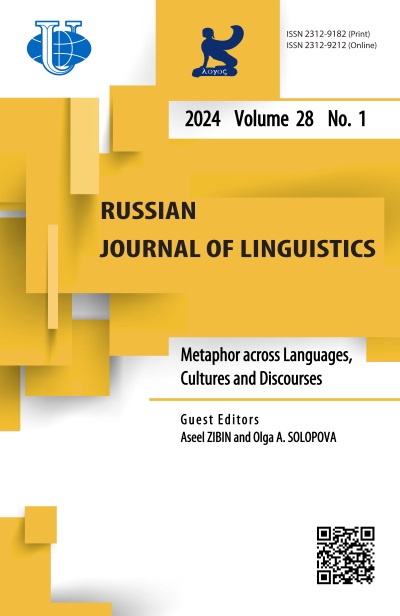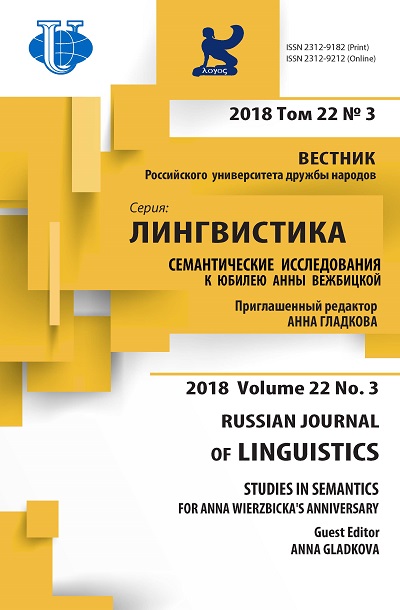Anna Wierzbicka, Semantic Decomposition, and the Meaning-Text Approach
- Authors: Mel’čuk I.A1
-
Affiliations:
- Observatoire de linguistique Sens-Texte Université de Montréal
- Issue: Vol 22, No 3 (2018): Studies in semantics: for Anna Wierzbicka’s anniversary
- Pages: 521-538
- Section: STUDIES IN SEMANTICS: For Anna Wierzbicka’s anniversary
- URL: https://journals.rudn.ru/linguistics/article/view/19345
- DOI: https://doi.org/10.22363/2312-9182-2018-22-3-521-538
Cite item
Full Text
Abstract
About the authors
Igor A Mel’čuk
Observatoire de linguistique Sens-Texte Université de Montréal
Email: igor.melcuk@umontreal.ca
Professor Emeritus at the University of Montreal, Canada, the author of 47 books and 279 published scientific papers. His research interests include general linguistics (with special attention to its conceptual apparatus and terminology), semantics (with special attention to lexicology and lexicography), syntax (with special attention to dependency structures), and morphology; his work is based mostly on Russian and French, but concerns also English and several other languages (Hungarian, Lezghian, Alutor, Dyirbal, Bafia, Kirundi, Korean). He is the proponent of the MeaningText approach to natural language and one of the pioneers of Machine Translation-since 1954. Case postale 6128 Centre-ville, Montréal H3C3J7, Canada
References
- Apresjan, Jurij. (1974). Leksičeskaja semantika. Sinonimičeskie sredstva jazyka [Lexical Semantics. Synonymic Means of Language]. Moscow: Nauka.
- Apresjan, Yuri. (1992). Lexical Semantics. User’s Guide to Contemporary Russian Vocabulary. Ann Arbor, MI: KAROMA.
- Apresjan, Jurij, ed. (2014). Aktivnyj slovar´ russkogo jazyka [Active Dictionary of Russian]. Avtory: V.Ju. Apresjan, Ju.D. Apresjan, E.È. Babaeva, O.Ju. Boguslavskaja, I.V. Galaktionova, M.Ja. Glovinskaja, B.L. Iomdin, T.V. Krylova, I.B. Levontina, A.A. Lopuxina, A.V. Ptencova, A.V. Sannikov, E.V. Uryson. Volumes 1-2. Moscow: Jazyki slavjanskoj kul´tury.
- Apresyan, Yuri, Mel’čuk, Igor & Žolkovsky, Alexander. (1969). Semantics and lexicography: Towards a new type of unilingual dictionary. In: F. Kiefer, ed., Studies in Syntax and Semantics, Dordrecht: Reidel, 1-33.
- Goddard, Cliff & Wierzbicka, Anna. (2014). Words and Meanings. Lexical Semantics across Domains, Languages, and Cultures. Oxford: Oxford University Press.
- Mel´čuk, Igor. (1974). Opyt teorii lingvističeskix modelej “Smysl Û Tekst”. Semantika, sintaksis [Outline of a Theory of Meaning-Text Linguistic Models. Semantics and Syntax]. Моscow: Nauka.
- Mel’čuk, Igor. (2001). Communicative Organization in Natural Language. Amsterdam/Philadelphia: John Benjamins.
- Mel’čuk, Igor. (2012a). Jazyk: ot smysla k tekstu [Language: From Meaning to Text]. Moskow: Jazyki slavjanskoj kul´tury.
- Mel’čuk, Igor. (2012b. Semantics: From Meaning to Text. Vol. 1. Amsterdam/Philadelphia: John Benjamins.
- Mel’čuk, Igor. (2013). Semantics: From Meaning to Text. Vol. 2. Amsterdam/Philadelphia: John Benjamins.
- Mel’čuk, Igor. (2015). Semantics: From Meaning to Text. Vol. 3. Amsterdam/Philadelphia: John Benjamins.
- Mel’čuk, Igor. (2016). Language: From Meaning to Text. Moskow/Boston: Academic Studies Press. Mel’čuk, Igor & Zholkovsky, Alexander. (1984). Explanatory Combinatorial Dictionary of Modern Russian. Vienna: Wiener Slawistischer Almanach. See also: http://olst.ling.umontreal.ca/pdf/Melcuk_Zholkovsky_1984.pdf.
- Mel’čuk, Igor´ & Žolkovskij, Aleksandr. (2016). Tolkovo-kombnatornyj slovar´ russkogo jazyka. 2-oe izdanie, ispravlennoe. Moscow: Jazyki slavjanskix kul´tur.
- Padučeva, Elena. (1996). Fenomen Anny Vežbickoj [Anna Wierzbicka’s Phenomenon]. In: Vežbickaja, Anna, Jazyk. Kul´tura. Poznanie, Moscow: Russkie slovari, 5-32.
- Wierzbicka, Anna. (1972). Semantic Primitives. Frankfurt am Main: Athenäum.
- Wierzbicka, Anna. (1988). The Semantics of Grammar. Amsterdam/Philadelphia: John Benjamins. Wierzbicka, Anna. (1992). Semantics, Culture, and Cognition. Universal Human Concepts in Culture-Specific Configurations. New York/Oxford: Oxford University Press.
- Wierzbicka, Anna. (2001). What Did Jesus Mean? Explaining the Sermon on the Mount and the Parables in Simple and Universal Human Concepts. Oxford: Oxford University Press.
- Wierzbicka, Anna. (2014a). Imprisoned in English. The Hazards of English as a Default Language. Oxford: Oxford University Press.
- Wierzbicka, Anna. (2014b). Can there be common knowledge without a common language? German Pflicht versus English Duty. Common Knowledge, 21 (1), 140-171.
- Wierzbicka, Anna. (2018). Speaking about God in universal words, thinking about God outside English. In: Paul Chilton and Monika Kopytowska (eds.), Religion, Language, and the Human Mind, 19-51. Oxford: Oxford University Press.
- Wierzbicka, Anna (2018). Emotions of Jesus. Russian Journal of Linguistics, 22 (1), 38-53. doi: 10.22363/2312-9182-2018-22-1-38-53.
- Žolkovskij, Аleksandr. (1964a). Predislovie [Foreword]. Mašinnyj perevod i prikladnaja lingvistika, 8, 3-16.
- Žolkovskij, Аleksandr. (1964b). O pravilax semantičeskogo analiza [Rules for semantic analysis]. Mašinnyj perevod i prikladnaja lingvistika, 8, 17-32.
- Žolkovskij, Аleksandr. (1964c.) Leksika celesoobraznoj dejatel´nosti [Vocabulary of teleological activity]. Mašinnyj perevod i prikladnaja lingvistika, 8, 67-103.
- Žolkovskij, Аleksandr, Leont´eva, Nina & Martem´janov, Jurij. (1961). O principial´nom ispol´zovanii smysla pri mašinnom perevode [On an essential use of meaning in machine translation]. In: Mašinnyj perevod, vol. 2, Moscow: Institut točnoj mexaniki i vyčislitel´noj texniki AN SSSR, 17-46.
- NB: For English translations of Zholkovsky’s papers, see Rozencvejg, V. (ed.) (1974), Essays on Lexical Semantics, Stockholm: Skriptor; and Rozencvejg, V. (ed.) (1974), Machine Translation and Applied Linguistics, Frankfurt am Main: Athenaion Verlag.
- Žolkovskij, Аleksandr & Mel´čuk, Igor´. (1965). O vozmožnom metode i instrumentax semantičeskogo sinteza [On a possible method and some tools of semantic synthesis]. Naučno-texničeskaja informacija, 5, 23-28.
- Žolkovskij, Аleksandr & Mel´čuk, Igor´. (1966). O sisteme semantičeskogo sinteza. I. Stroenie slovarja [A system for semantic synthesis. I. The structure of the dictionary]. Naučno-texničeskaja informacija, 11, 48-55.
- Žolkovskij, Аleksandr & Mel´čuk, Igor´. (1967). O semantičeskom sinteze [On semantic synthesis]. Problemy kibernetiki, 19, 177-238.

















